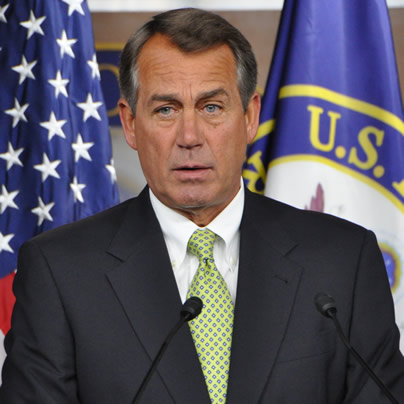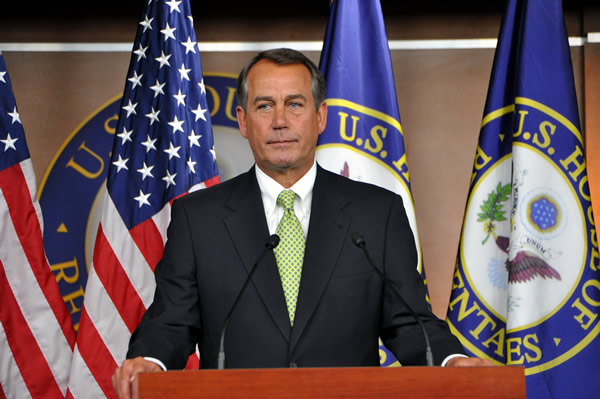National
Boehner maxes out $1.5 mil cost cap for DOMA defense
Dems decry continued support for anti-gay law as ‘unconscionable’


The $1.5 million cost cap that House Speaker John Boehner has allotted to defend DOMA has been reached (Blade file photo by Michael Key)
The House Republican-led panel that has taken up defense of the Defense of Marriage Act in court has maxed out the $1.5 million cost cap set to hire private attorneys to advocate for the anti-gay law, according to a report from Democratic lawmakers.
On Tuesday, Democrats on the Committee on House Administration made public a report stating the House Bipartisan Legal Advisory Group — which took up defense of DOMA after the Obama administration announced it would no longer defend the law in court — has reached expenses totaling out to $1,447,996.73 over the course of fiscal years 2011 and 2012.
That’s just shy of the $1.5 million cost cap that House Republicans set last year to pay private attorney Paul Clement, a former U.S. solicitor general under the Bush administration, to defend DOMA. Thus far, Clement has lost in five federal courts against lawsuits challenging the constitutionality of DOMA — most notably after U.S. First Circuit Court of Appeals became the first appellate court to strike down the law.
In a statement, House Minority Leader Nancy Pelosi (D-Calif.) slammed House Republicans and Speaker John Boehner (R-Ohio) for their continued defense of DOMA, which prohibits federal recognition of same-sex marriage, at the expense of taxpayer money.
“For more than a year, Speaker Boehner and Congressional Republicans have committed valuable taxpayer dollars to defending discrimination and preserving inequality – only to lose case after case in their effort to uphold the Defense of Marriage Act,” Pelosi said. “There is nothing effective or efficient about this utter abuse of the people’s trust or the public purse; it is simply wasteful and wrong, and Americans deserve better.”
Pelosi added that it’s “unconscionable” for House Republicans — including Chair of the Committee on House Administration Dan Lungren (R-Calif.) — to have authorized a contract to hire a private attorney to defend the DOMA in court and renewed her call for them “to drop their frivolous, taxpayer-funded lawsuits without any delay.”
“Rather than join Democrats to create jobs and strengthen the middle class, Republicans refuse to abandon their reprehensible fight to deny basic civil rights and justice to an entire group of their fellow Americans,” Pelosi said. “The American people should no longer have to foot the bill for Speaker Boehner’s campaign to appease the most conservative forces within the Republican Party.”
The report produced by Democrats on the House itemizes the expenses for defense of DOMA on a periodic basis. Total expenses for defending DOMA in court was $702,205.57 in FY-11 and $745,791.16 in FY-12.
The last billable period was from July 1 to Aug. 15, which totaled out to $169,237.35. More activity in defending DOMA has already occurred since that time, including Clement’s defense of DOMA late last month before the U.S. Second Circuit of Appeals against New York widow Edith Windsor’s challenge to the law.
The highest periodic expense for defending was between June 1 and July 31 when $358,736.58 was expended to defend the anti-gay law. At that time, there was a flurry of activity on DOMA because the Obama administration for the first time filed a legal brief against the law in the case of Golinksi v. Office of Personnel Management.
Now that the cost cap for funding the defense of DOMA has been reached, questions linger about whether House Republicans will raise the cap to continue defend against DOMA litigation, which is currently pending for considering before the U.S. Supreme Court. A provision in contract enables an increase in the cost cap upon agreement of the parties involved.
Neither Boehner’s office nor the House Committee on Administration responded to the Washington Blade’s request to comment about the cost cap or whether Republicans would raise the limit to defend the anti-gay law.
Doug NeJaime, who’s gay and a law professor at Loyola Law School, said he’s unable to comment on the cost cap itself, but predicted that continued defense of the law before the Supreme Court would come at considerable expense.
“I’m not surprised at how much in legal fees has been expended up to this point,” NeJaime said. “There are multiple DOMA suits pending and there has been a flurry of activity at the Supreme Court, and BLAG is represented by an experienced and expensive legal team. If the Supreme Court takes up DOMA, these fees will increase considerably.”
Other Democrats followed Pelosi’s lead in criticizing House Republicans. New York Rep. Jerrold Nadler, the top Democrat on the House Judiciary Subcommittee on the Constitution, took Boehner to task in a statement for expending $1.5 million to pay for the defense of the anti-gay law.
“Speaker Boehner has wasted more than a year, and more than $1.5 million taxpayer dollars defending DOMA,” Nadler said. “So far, he has lost five cases in a row as every court has ruled that there is no legitimate justification for this law. Every day, DOMA harms thousands of American couples and their children. Instead of wasting taxpayer money defending this unjust law in court, Speaker Boehner should join us in our effort to repeal it.”
In a separate statement to the Blade, Rep. Mike Honda (D-Calif.) decried House Republicans’ defense of DOMA in response to an inquiry on whether he’d oppose further raising the cost cap for House Republicans to advocate on behalf of DOMA in court.
“It’s a waste of taxpayer money to spend more on overpriced lawyers to defend an outdated, unconstitutional law – one that is opposed by the majority of Americans,” Honda said. “We should be focused on creating jobs, bringing down the deficit, and getting the economy back on track. Loving, committed couples are making lifelong promises of fidelity to one another. It’s past time the federal government stop singling out the LGBT community and celebrate these families like any other.”
As a member of the House Legislative Branch Appropriations Subcommittee, the lawmaker last year raised questions about whether allocating funds for the defense of DOMA violated the Anti-Deficiency Act.
New York
Two teens shot steps from Stonewall Inn after NYC Pride parade
One of the victims remains in critical condition

On Sunday night, following the annual NYC Pride March, two girls were shot in Sheridan Square, feet away from the historic Stonewall Inn.
According to an NYPD report, the two girls, aged 16 and 17, were shot around 10:15 p.m. as Pride festivities began to wind down. The 16-year-old was struck in the head and, according to police sources, is said to be in critical condition, while the 17-year-old was said to be in stable condition.
The Washington Blade confirmed with the NYPD the details from the police reports and learned no arrests had been made as of noon Monday.
The shooting took place in the Greenwich Village neighborhood of Manhattan, mere feet away from the most famous gay bar in the city — if not the world — the Stonewall Inn. Earlier that day, hundreds of thousands of people marched down Christopher Street to celebrate 55 years of LGBTQ people standing up for their rights.
In June 1969, after police raided the Stonewall Inn, members of the LGBTQ community pushed back, sparking what became known as the Stonewall riots. Over the course of two days, LGBTQ New Yorkers protested the discriminatory policing of queer spaces across the city and mobilized to speak out — and throw bottles if need be — at officers attempting to suppress their existence.
The following year, LGBTQ people returned to the Stonewall Inn and marched through the same streets where queer New Yorkers had been arrested, marking the first “Gay Pride March” in history and declaring that LGBTQ people were not going anywhere.
New York State Assemblywoman Deborah Glick, whose district includes Greenwich Village, took to social media to comment on the shooting.
“After decades of peaceful Pride celebrations — this year gun fire and two people shot near the Stonewall Inn is a reminder that gun violence is everywhere,” the lesbian lawmaker said on X. “Guns are a problem despite the NRA BS.”
New York
Zohran Mamdani participates in NYC Pride parade
Mayoral candidate has detailed LGBTQ rights platform

Zohran Mamdani, the candidate for mayor of New York City who pulled a surprise victory in the primary contest last week, walked in the city’s Pride parade on Sunday.
The Democratic Socialist and New York State Assembly member published photos on social media with New York Attorney General Letitia James, telling followers it was “a joy to march in NYC Pride with the people’s champ” and to “see so many friends on this gorgeous day.”
“Happy Pride NYC,” he wrote, adding a rainbow emoji.
Mamdani’s platform includes a detailed plan for LGBTQ people who “across the United States are facing an increasingly hostile political environment.”
His campaign website explains: “New York City must be a refuge for LGBTQIA+ people, but private institutions in our own city have already started capitulating to Trump’s assault on trans rights.
“Meanwhile, the cost of living crisis confronting working class people across the city hits the LGBTQIA+ community particularly hard, with higher rates of unemployment and homelessness than the rest of the city.”
“The Mamdani administration will protect LGBTQIA+ New Yorkers by expanding and protecting gender-affirming care citywide, making NYC an LGBTQIA+ sanctuary city, and creating the Office of LGBTQIA+ Affairs.”
U.S. Supreme Court
Supreme Court upholds ACA rule that makes PrEP, other preventative care free
Liberal justices joined three conservatives in majority opinion

The U.S. Supreme Court on Friday upheld a portion of the Affordable Care Act requiring private health insurers to cover the cost of preventative care including PrEP, which significantly reduces the risk of transmitting HIV.
Conservative Justice Brett Kavanaugh authored the majority opinion in the case, Kennedy v. Braidwood Management. He was joined by two conservatives, Chief Justice John Roberts and Justice Amy Coney Barrett, along with the three liberal justices, Sonia Sotomayor, Elena Kagan, and Ketanji Brown-Jackson.
The court’s decision rejected the plaintiffs’ challenge to the Affordable Care Act’s reliance on the U.S. Preventative Services Task Force to “unilaterally” determine which types of care and services must be covered by payors without cost-sharing.
An independent all-volunteer panel of nationally recognized experts in prevention and primary care, the 16 task force members are selected by the secretary of the U.S. Department of Health and Human Services to serve four-year terms.
They are responsible for evaluating the efficacy of counseling, screenings for diseases like cancer and diabetes, and preventative medicines — like Truvada for PrEP, drugs to reduce heart disease and strokes, and eye ointment for newborns to prevent infections.
Parties bringing the challenge objected especially to the mandatory coverage of PrEP, with some arguing the drugs would “encourage and facilitate homosexual behavior” against their religious beliefs.
-

 U.S. Supreme Court4 days ago
U.S. Supreme Court4 days agoSupreme Court upholds ACA rule that makes PrEP, other preventative care free
-

 U.S. Supreme Court4 days ago
U.S. Supreme Court4 days agoSupreme Court rules parents must have option to opt children out of LGBTQ-specific lessons
-

 National5 days ago
National5 days agoEvan Wolfson on the 10-year legacy of marriage equality
-

 Congress5 days ago
Congress5 days agoSenate parliamentarian orders removal of gender-affirming care ban from GOP reconciliation bill












